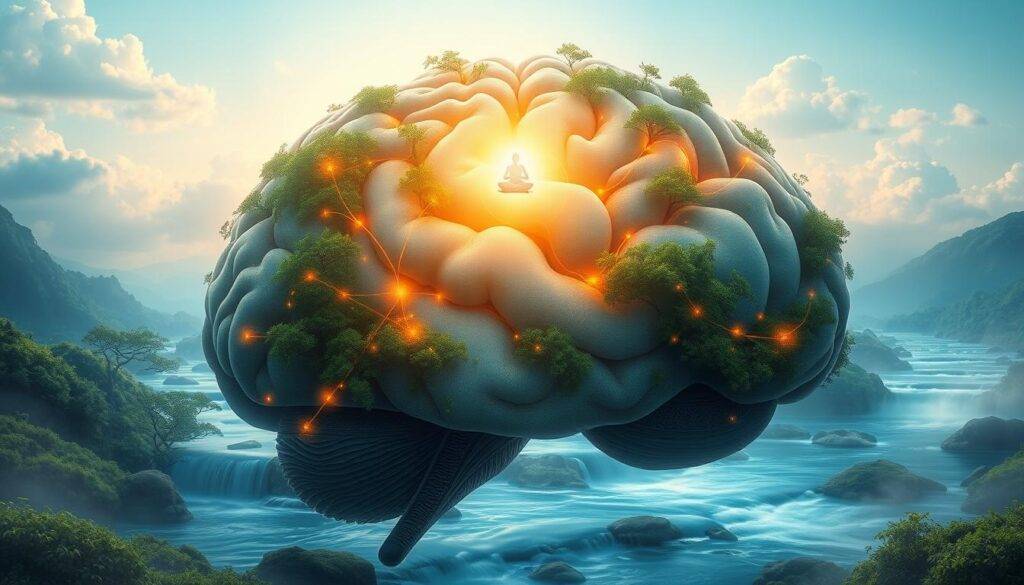“The greatest weapon against stress is our ability to choose one thought over another.” – William James, Renowned Psychologist
In today’s world, finding natural ways to deal with mental health issues like depression is a big hope. Meditation, an old practice of deep thinking and being in the moment, is a strong tool for fighting depression. It helps people find their way back to feeling better and living with purpose.
Studies have shown meditation’s amazing power to help with depression. A big review of 47 studies with 3,515 volunteers found meditation works as well as some medicines. People saw a 10% to 20% better mood and a 5% to 10% less anxiety after eight weeks of meditation.
Key Takeaways
- Meditation has been shown to provide similar relief from depression symptoms as antidepressant medications.
- Mindfulness meditation, a practice focused on present-moment awareness, can interrupt negative thought patterns and help manage distressing emotions.
- Incorporating meditation into daily life can lead to more sustained improvements in depression symptoms compared to treating it as a temporary fix.
- Meditation can also offer benefits for reducing anxiety and lowering the risk of depression relapse.
- The natural, holistic approach of meditation provides a complementary option for those seeking an alternative to traditional depression treatments.
Understanding Depression and Its Impact on Mental Health
Depression is a common mental health issue that affects your mood and life quality. It shows up in many ways, like feeling sad all the time or having major depressive episodes. Knowing the signs and how your mind and body are connected is key to managing it.
Common Symptoms and Warning Signs
Depression often makes you feel hopeless, worthless, and sad all the time. You might lose interest in things you used to love, feel tired, irritable, or have trouble focusing. It can also change how you sleep, eat, and even make you think about harming yourself.
The Connection Between Mind and Body
Depression is linked to your mind and body. Bad thoughts and feelings can cause physical problems like pain, stomach issues, and more. At the same time, health issues or hormonal problems can make you feel depressed. It’s important to understand this connection to manage your mental health well.
How Depression Affects Daily Life
Depression can affect your life in many ways. It can hurt your relationships, make it hard to work, and lower your quality of life. It can also make you miss work, be less productive, and make health problems worse.
By understanding how depression works and its effects on mental health, you can start to manage it better.
| Depression Prevalence and Risk Factors | Gender Differences in Depression Symptoms |
|---|---|
|
|
“Depression can significantly impact daily life, affecting relationships, work performance, and overall quality of life.”
The Science Behind Meditation for Depression Relief
Discover how meditation can help manage depression. Studies show it has deep effects on the mind and body. These effects are especially important for those with depressive symptoms.
Meditation can lower brain and body inflammation, a major cause of depression. It also changes the brain’s structure and function. This includes areas for emotional control and self-awareness.
Also, meditation boosts the vagus nerve, key for mood and emotional health. Through the mind-body link, mindfulness techniques, cognitive-behavioral therapy, and relaxation exercises offer a natural way to fight depression.
“Meditation can profoundly impact the brain’s shape and size, leading to tangible improvements in mental health and emotional resilience.”
Research by Gaelle Desbordes and Sara Lazar has revealed meditation’s brain-changing effects. Their work shows meditation can reduce depression symptoms and boost well-being.

The link between mind and body is being explored more. Meditation’s role in treating depression is becoming clearer. It offers a path to better mental and emotional health.
How Meditation Changes Brain Structure and Function
Meditation changes the brain in amazing ways. Studies show it can make different parts of the brain bigger. These areas help with feelings, focus, and knowing yourself.
Impact on Gray Matter and Neural Pathways
Just 7 weeks of meditation can make the hippocampus bigger. This part of the brain is key for memory and feelings. The amygdala, the fear center, also gets smaller with mindfulness.
These changes help with mental health, stress reduction, and emotional well-being.
Effects on the Vagus Nerve
Meditation also boosts the vagus nerve. This nerve connects the brain to the belly and affects mood. It helps improve emotional well-being and mental health.
Inflammation Reduction Benefits
Regular meditation can lower brain and body inflammation. This is good because inflammation is linked to depression. Meditation helps reduce stress and boosts emotional well-being.
Meditation changes the brain in ways that help with depression. It reshapes the brain and improves connections. This makes meditation a natural way to improve mental health and emotional well-being.
Getting Started with Meditation Practice
Starting a mindfulness techniques practice can help you manage stress reduction and boost your self-care practices. Find a comfy spot to sit, stand, or lie down. Then, focus on your breath. Take slow, deep breaths through your nose, feeling each inhale and exhale.
When thoughts pop up, just notice them without judgment. Then, gently bring your focus back to your breath. You can also notice how your body feels, doing a gentle body scan. Start with 5-minute sessions and grow them as you get more into it.
Being consistent is crucial for meditation’s benefits. Set a regular time each day for your practice. It could be right after waking up, during a break at work, or before bed. Having a set time helps make meditation a habit.
- Begin with short, 5-minute sessions and gradually increase the duration
- Find a comfortable position that allows you to focus on your breath and body
- Acknowledge thoughts without judgment and gently redirect your attention
- Establish a consistent daily practice to maximize the self-care practices benefits
“Meditation is not about becoming a different person, a new person, or even a better person. It is about training in awareness and deepening our understanding of who we already are.” – Pema Chödrön
Remember, meditation is about being patient, kind to yourself, and open to the present moment. With regular practice, you can tap into the power of mindfulness techniques to improve your mental health and well-being.

Essential Mindfulness Techniques for Depression Management
If you’re dealing with depression, adding mindfulness to your day can help a lot. Studies show mindfulness can ease depression, stabilize mood, and cut down on symptoms. Let’s look at some key mindfulness techniques for quick relief and lasting benefits.
Breathing Exercises for Immediate Relief
Feeling overwhelmed? Focus on your breath for a calm moment. Take deep, slow breaths, inhaling through your nose and exhaling through your mouth. This can calm your nervous system and bring relaxation.
Body Scan Meditation Methods
Body scan meditation is about paying attention to your body, noticing sensations without judgment. It keeps you present and stops negative thinking. By being gentle with your body, you can break the cycle of depression.
Present Moment Awareness Practices
Practices like mindfulness meditation or sensory exercises help manage depression. They keep you in the now, away from worries about the past or future. This can lead to calm, clarity, and emotional balance.
Adding these mindfulness techniques to your daily life can support other ways to manage depression. Regular practice can help you handle depression’s ups and downs better. It can also increase your resilience and well-being.
Integrating Meditation into Your Daily Routine
Adding self-care practices like meditation to your daily life can change how you handle stress reduction and improve your emotional well-being. Start small and build up your practice over time.
Choose a specific time and place for meditation. Many prefer morning or before bed. Use a reminder or app to stay consistent.
- Begin with short sessions, like 5-10 minutes a day. Increase time as you get more comfortable.
- Try to fit meditation into your daily routines. For example, do a body scan while showering or practice mindful walking.
- Be gentle with yourself. It’s more important to be consistent than perfect in meditation.
| Meditation Technique | Benefits |
|---|---|
| Breath Awareness | Calms the mind, reduces stress and anxiety |
| Body Scan | Enhances body awareness, promotes relaxation |
| Loving-Kindness | Cultivates compassion for self and others |
Unlock meditation’s power by making it a regular part of your life. Start small, be patient, and enjoy the journey. Your mind and body will appreciate it.
“Meditation is not about becoming a different person, but about creating who you are.” – Oprah Winfrey
Types of Meditation Most Effective for Depression
Looking for ways to ease depression through meditation? Some methods stand out as especially helpful. Let’s dive into three effective meditation practices for managing depression symptoms.
Loving-Kindness Meditation
Loving-kindness meditation, or Metta meditation, focuses on spreading kindness and compassion. It helps you feel more connected to yourself and others. Studies show it can reduce depression, improve mood, and increase empathy.
Walking Meditation
Adding physical activity to meditation can greatly help with depression. Walking meditation combines mindfulness with movement. It boosts both mental and physical health. Research found it lowers depression in older adults more than regular walking.
Mindfulness-Based Cognitive Therapy
Mindfulness-Based Cognitive Therapy (MBCT) blends mindfulness with cognitive-behavioral therapy. It’s great for preventing depression from coming back. MBCT helps you notice and handle negative thoughts better.
Choosing loving-kindness, walking meditation, or MBCT can be a game-changer. These practices help you develop mindfulness, self-compassion, and emotional awareness. They unlock meditation’s healing power, helping you regain your mental health.
Combining Meditation with Traditional Depression Treatments
Meditation is a strong tool for managing mental health and boosting emotional well-being. But, it should be used alongside traditional treatments, not instead of them. Talk to healthcare experts to create a plan that includes therapy, medication, and lifestyle changes, along with meditation.
Some therapists now use mindfulness-based cognitive therapy (MBCT). This combines meditation with traditional therapy. MBCT has been shown to help prevent depression from coming back in people who have had it before.
Remember, meditation isn’t for everyone, especially during very bad depressive episodes. If your feelings get worse or you can’t handle them, get help from a professional. By mixing meditation with other proven treatments, you can make a strong plan to help your mental health and emotional well-being.
FAQ
What are the benefits of using meditation for depression relief?
Studies show meditation can help as much as antidepressants. People see a 10% to 20% drop in depression symptoms after eight weeks. Mindfulness meditation stops negative thinking and helps manage stress.
How does the mind-body connection play a role in depression?
The mind-body connection is key in depression. Negative thoughts can cause physical symptoms and vice versa. Depression affects daily life, including relationships and work.
In what ways can meditation alter brain structure and function?
Meditation can change the brain in just seven weeks. It increases gray matter in important areas. It also boosts mood by stimulating the vagus nerve. Meditation reduces brain inflammation, linked to depression.
How can you get started with a meditation practice for depression relief?
Start by sitting comfortably and focusing on your breath. Take slow, deep breaths. When thoughts come, acknowledge them and return to your breath.
Expand your awareness to your body. Start with 5 minutes a day and increase as you get more comfortable. Meditate at the same time each day to make it a habit.
What are some essential mindfulness techniques for managing depression?
Breathing exercises help in stressful moments. Body scan meditation focuses on body sensations. Present moment awareness stops negative thoughts and grounds you.
These techniques are great for managing depression. They help interrupt negative thinking and bring calm.
How can you integrate meditation into your daily routine?
Choose a consistent time and place for meditation. Many meditate in the morning or before bed. Start with short sessions and increase as you get more comfortable.
Use reminders or apps to stay consistent. Try to meditate during daily routines, like while showering or walking. Be patient and remember, consistency is key.
What types of meditation are most effective for treating depression?
Loving-kindness meditation boosts compassion and fights depression’s isolation. Walking meditation combines physical activity with mindfulness. Mindfulness-Based Cognitive Therapy (MBCT) is effective in preventing depression relapse.
How should meditation be used in combination with traditional depression treatments?
Meditation is a powerful tool but should not replace traditional treatments. Work with mental health professionals to create a comprehensive plan. Meditation can be part of therapy, like mindfulness-based cognitive therapy.
Be aware that meditation isn’t for everyone, especially during severe episodes. Always seek professional help if symptoms worsen.




























































